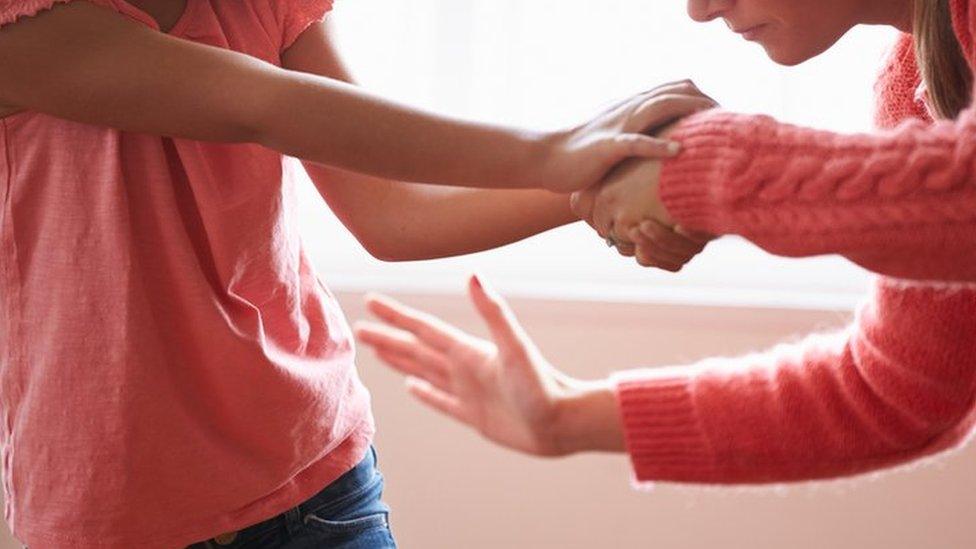Week ahead at Holyrood: Smacking ban faces first hurdle
- Published

MSPs are set to debate legislation to ban smacking children.
Holyrood's equalities committee backed a bill giving children "equal protection from assault" earlier this month.
Proponents of the bill say smacking does not have a place in modern society.
However others - including some Conservative MSPs - have argued that the bill takes a "heavy-handed approach".
If passed, the Children (Equal Protection from Assault) (Scotland) Bill , externalwould remove the defence of "reasonable chastisement" or "justifiable assault" in Scots law.
Smacking has already been outlawed in several countries and a 2017 consultation found strong public support for altering the law in Scotland.
What else is happening at the Scottish Parliament this week?
Tuesday - Polmont YOI deaths
Katie Allan was jailed in March 2018 and died at Polmont Prison the following June
In the morning, the Justice Committee will be hearing from chief prisons inspector Wendy Sinclair-Gieben about mental health services at Polmont Young Offenders' Institution.
Last week, a report from the inspectorate called for the creation of a stronger suicide and self-harm strategy following the deaths of two young people in custody.
Katie Allan, 21, and 16-year-old William Lindsay died in 2018.
Ms Allans's parents have claimed that she was bullied in prison, and that prison staff failed to heed warnings that she was "vulnerable" and had a history of self-harming.
The committee will then consider secure care places more broadly, looking at whether Scotland is meeting its human rights obligations to young people in secure care and custody.
Before the smacking ban debate in the afternoon will be topical questions, which will probably touch on the EU election results and Brexit.
After it, Labour MSP Mary Fee will lead a member's debate on a recent report highlighting the impact of the universal credit system on mental health.
The Scottish Association for Mental Health (SAMH) called for no one to be transfer to universal credit , externalin its current form, highlighting the hardship and emotional distress caused.
Wednesday - BiFab and renewables jobs
Scottish Labour will lead a debate on BiFab and renewable energy contracts.
It follows the launch of a union campaign to save construction yards in Fife which look set to lose out on work for a huge EDF wind farm project.
Concerns have been raised that the Scottish company has been unable to compete with foreign companies.
The JV Driver Group - which owns BiFab - told MSPs on the economy committee that they were "having to compete against businesses that lose money".
Spanish-owned Navantia, which recently won a wind farm contract being developed by Kincardine Offshore Wind Limited, was specifically highlighted and issues relating to state aid rules were alluded to.
Scottish Labour leader Richard Leonard and First Minister Nicola Sturgeon agreed at FMQs last week to work together on the motion for this debate. Whether common ground was found is yet to be seen.
Health and local government ministers face portfolio questions before this, and the evening member's debate will be led by Green MSP Mark Ruskell on railway expansion.
In the morning, the education committee holds its final evidence session on subject choices in schools with Education Secretary John Swinney.
A debate in the chamber called for "urgent action" on "fundamental failings" around subject choice in schools.
But Mr Swinney insists a wide range of subjects is available and that exam passes are on the up.
Thursday - economic forecasts
Finance Secretary Derek Mackay will deliver the medium-term financial strategy on Thursday afternoon.
This is essentially Scotland's version of the autumn statement.
Mr Mackay will set out new economic forecasts and his broad spending plans for the next five years.
This will be sandwiched by social security portfolio questions and a debate on trade.
First minister's questions reverts to its usual noon slot, to be followed by a debate from SNP MSP Gordon MacDonald on immigration policy and the Edinburgh festivals.
Earlier, the culture committee will discuss the funding of the arts from a range of stakeholders.
The inquiry was launched on the back of some criticism of Creative Scotland's handling of funding rounds last year.